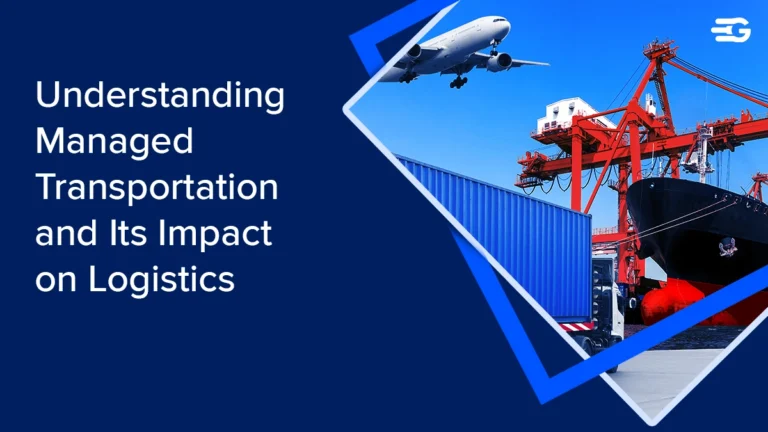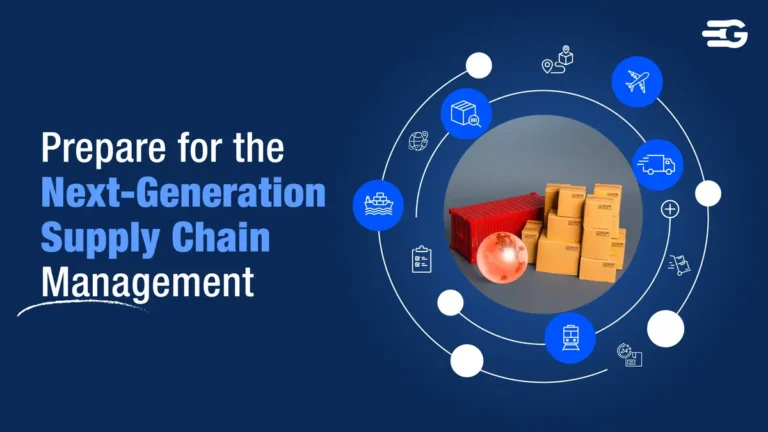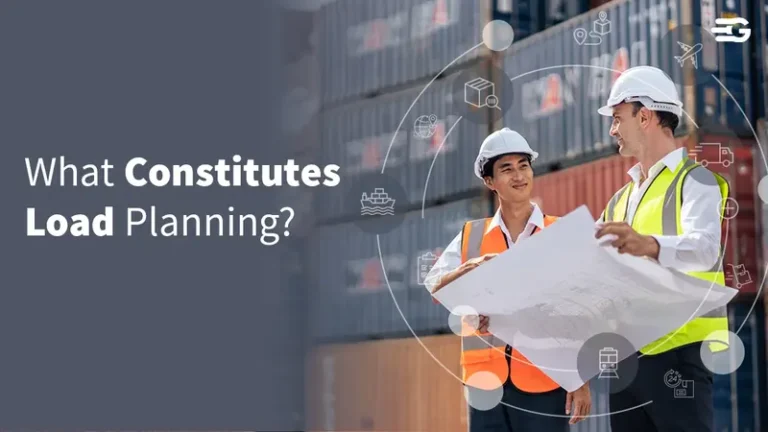Top 12 Logistics Management Software In 2024
Staying on top of logistics can be tough. With so many moving parts, errors happen easily. Logistics management software helps streamline operations, save costs, and boost efficiency. Here’s a list of the best Logistics Management Software solutions for 2024 to make your logistics operations smoother and smarter.
Criteria to Select The Best Logistics Management Software
Selecting the best logistics management software requires understanding your business needs and evaluating the software’s capabilities. Here’s a detailed breakdown to guide your decision:
- Scalability: Choose software that grows with your business. Look for solutions that handle increasing shipment volumes, support multi-location operations, and adapt to new market demands without performance issues. Cloud-based systems often excel in scalability.
- Real-Time Tracking: Ensure the software offers end-to-end shipment visibility. This feature helps monitor cargo locations, predict delivery times, and quickly address delays. Integration with IoT devices can enhance tracking accuracy, especially for temperature-sensitive or high-value goods.
- Automation: Automation is a game-changer. Features like automated freight booking, rate comparisons, and document generation reduce manual work, minimize errors, and improve operational efficiency. Prioritize software with workflow automation tailored to logistics tasks.
- Ease of Use: A user-friendly interface is non-negotiable. Complex tools can slow adoption and frustrate users. Opt for intuitive dashboards, drag-and-drop functionalities, and easy onboarding to empower your team from day one.
- Customer Support: Strong customer support is crucial. Look for software providers offering 24/7 assistance, dedicated account managers, and a clear escalation process. Quick response times can minimize disruptions during critical operations.
- Integration: Seamless integration with existing tools like ERP, accounting software, or WMS; streamlines operations. APIs and plug-and-play integrations make data sharing effortless, reducing time spent on manual inputs and reconciliation.
These criteria ensure that the software you choose aligns with your logistics goals, enhances productivity, and delivers long-term value.
Overview of Best Logistics Management Software
| Software | Best For | Pros | Cons |
| GoComet | Businesses of all sizes looking for an all-in-one logistics management solution with a focus on automation and real-time visibility. | – Streamlined procurement with AI-powered negotiation and quotation management. – End-to-end shipment visibility with real-time tracking. – Automated freight management. | – Limited SKU-level tracking. |
| SAP Logistics | Large enterprises with complex supply chains require a comprehensive and integrated logistics platform. | – Robust and scalable solution for managing all aspects of logistics operations. – Deep integration with other SAP products. – Strong track record and industry reputation. | – High implementation complexity. – Can be resource-intensive to maintain. |
| Oracle Transportation Management | Enterprises with global operations and high-volume transportation needs. | – Scalable solution for managing global transportation networks. – Advanced features for optimizing freight costs and carrier selection. – Strong analytics capabilities. | – Complex user interface. – Requires significant IT expertise to implement and maintain. |
| Magaya | Mid-sized businesses with diverse transportation needs. | – Flexible and user-friendly platform with a wide range of features. – Strong support for multi-modal transportation. – Scalable to meet the needs of growing businesses. | – May lack some of the advanced features of enterprise-level solutions. – Reporting capabilities may be limited. |
| Descartes Aljex Logistics | Businesses that require a global trade management solution in addition to TMS functionalities. | – Comprehensive solution for managing international trade and logistics. – Strong compliance capabilities. – Streamlined customs brokerage and documentation processes. | – Can be complex to learn and use. – May be more expensive than some standalone TMS solutions. |
| MercuryGate | Businesses looking for a cloud-based TMS solution with a focus on real-time visibility and collaboration. | – Real-time shipment tracking and exception management. – Strong collaboration tools for connecting with carriers and suppliers. – Easy-to-use cloud-based platform. | – May not be as feature-rich as some on-premise solutions. – Can be expensive for large enterprises. |
| Kuebix TMS | Businesses looking for a user-friendly and affordable TMS solution. | – Easy-to-use interface with a focus on automation. – Competitive pricing plans. – Strong customer support. | – May lack some of the advanced features of more expensive solutions. – Scalability may be limited for large enterprises. |
| FreightPOP | Businesses managing multi-modal logistics, including manufacturers, retailers, and 3PLs. | – Integrates with 1,500+ carriers for seamless logistics. – Automates freight processes to reduce manual errors. – Syncs with ERP, CRM, and accounting systems for efficient data management. | – Limited integration with platforms like Epicor Kinetics. – Interface lacks polish and tracking updates can be delayed. |
| Manhattan Associates | Large businesses needing scalable and efficient transportation management. | – Adapts to changing conditions. – Easy tracking with maps and dashboards. – Optimizes decisions through simulations. | – Optimization can lag as businesses grow. – Incomplete integrations cause disruptions. |
| E2open | – Businesses focused on road and rail logistics. | – Connects with 480,000+ logistics partners. – Offers predictive ETAs. – Provides real-time shipment tracking. | – Limited software integration. |
| CargoWise | – E-commerce businesses looking for shipping efficiency. | – Easy integration with WooCommerce and Magento. – Access to pre-negotiated shipping rates. – Auto-selects lowest-cost carrier. | – Inconsistent customer support. – Complex login with 30-40 clicks. |
| ShipStation | – E-commerce businesses needing efficient, automated shipping solutions. | – Works with major carriers and platforms. – Automates orders and labels. – Provides live tracking updates. | – Can be complex for beginners. – Increases with shipping volume. |
Top Logistics Management Software
1. GoComet
GoComet is an AI-driven logistics platform designed for end-to-end visibility and cost optimization. It automates freight procurement and tracking while providing dynamic predictive ETAs. Its key features include multimodal tracking, automated invoice reconciliation, and real-time rate comparison. Businesses benefit from improved supply chain transparency and reduced freight costs. However, smaller companies may find its extensive features overwhelming without adequate training.
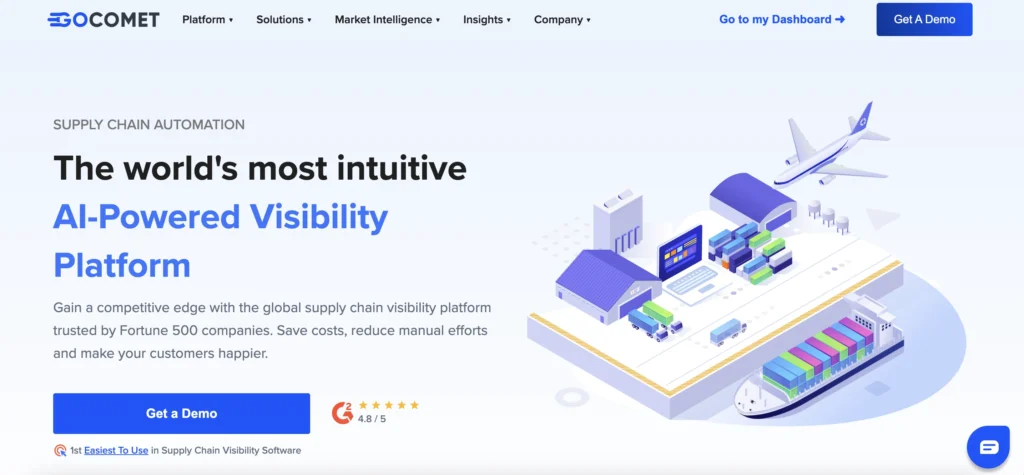
Key Features:
- AI-Powered Visibility: End-to-end shipment tracking with real-time updates, predictive ETAs, and instant alerts for seamless supply chain management.
- Cost and Workflow Automation: Automates freight procurement, invoice audits, and finance integration to reduce costs, avoid overpayments, and streamline operations.
- Data-Driven Optimization: Leverages analytics and machine learning to identify bottlenecks, monitor delays, and provide market rates, carrier insights, and port congestion data.
- Sustainability and Collaboration: Tracks carbon emissions, stores documents in the cloud, and enhances teamwork with automated data exchange and workflow tools.
Limitations:
- Limited SKU-Level Tracking: Detailed tracking at the individual SKU level is not fully supported, which can be challenging for businesses requiring granular visibility.
Ratings:
- G2– 4.8/5
- Gartner– 4.9/5
Testimonials:
“GoComet is a fantastic platform. It helped us in optimizing our logistics process. It gives real-time tracking visibility with precise data, automated reports. It helped us in digitizing the entire logistics process and ease out the auditing process.”
2. SAP Logistics – Comprehensive and Integrated Solutions
SAP Logistics stands out as a mainstay in the field of logistics software solutions, providing a solid and reputable platform to satisfy a wide range of company requirements. SAP Logistics’ extensive feature set is designed to efficiently optimize supply chain operations and streamline logistics procedures. SAP Logistics gives companies the tools they need to improve productivity and efficiency across their supply chain activities, from managing warehouses to assisting with order fulfillment and supervising transportation networks.
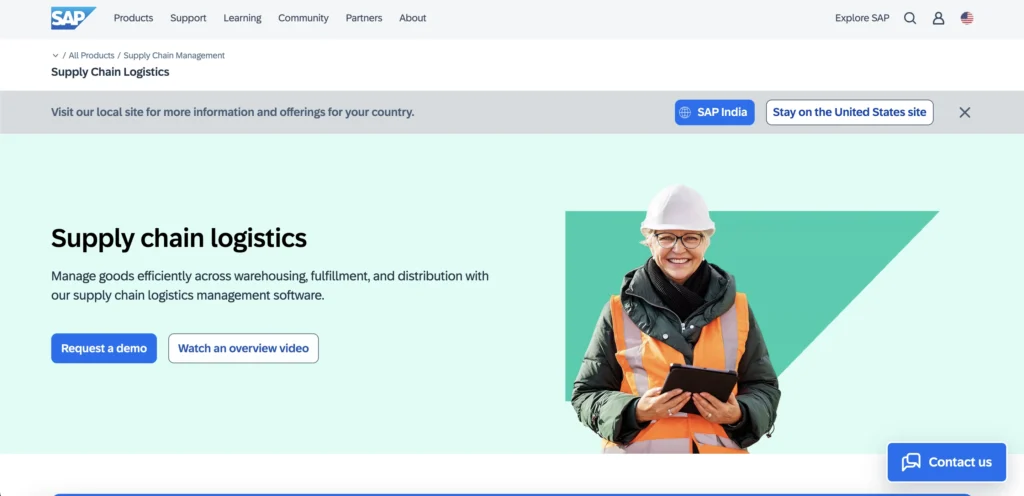
Key Features:
- Real-Time Visibility Across Supply Chains: SAP Logistics gives businesses live updates on their supply chain operations. It helps identify delays, anticipate risks, and address bottlenecks as they happen. This ensures smooth operations and reduces downtime.
- End-to-End Integration of Logistics Processes: The platform connects warehousing, transportation, and order fulfillment in a single system. This integration minimizes errors, speeds up delivery times, and ensures accurate execution of logistics tasks.
- Collaborative Supply Chain Management: SAP connects businesses with partners across transportation modes and geographies. This collaboration boosts operational efficiency and ensures seamless coordination among stakeholders.
- Sustainable and Efficient Operations: SAP optimizes logistics processes such as shipment planning, inventory management, and freight tracking. It also helps businesses lower emissions while maintaining high efficiency in their supply chain.
Limitations:
- Steep Learning Curve: Users report that mastering SAP Transportation Management takes time and extensive training, slowing initial adoption.
- Complex Integration: Setting up and integrating the system with existing tools can be technically demanding and time-consuming.
Ratings:
- G2– 4.4/ 5
- Gartner– 4.3/5
Testimonials:
“Tool is overall good as a standard planning tool, per build a lot of best practices , but lack of AI or the new interesting stuff , fancy user interface /dashboard etc.”
3. Oracle Transportation Management – Advanced and Scalable
The logistics software package Oracle Transportation Management (OTM) presents itself as all-inclusive. It serves companies looking for a complete picture of their transportation operations, including order processing through to the point of ultimate delivery.
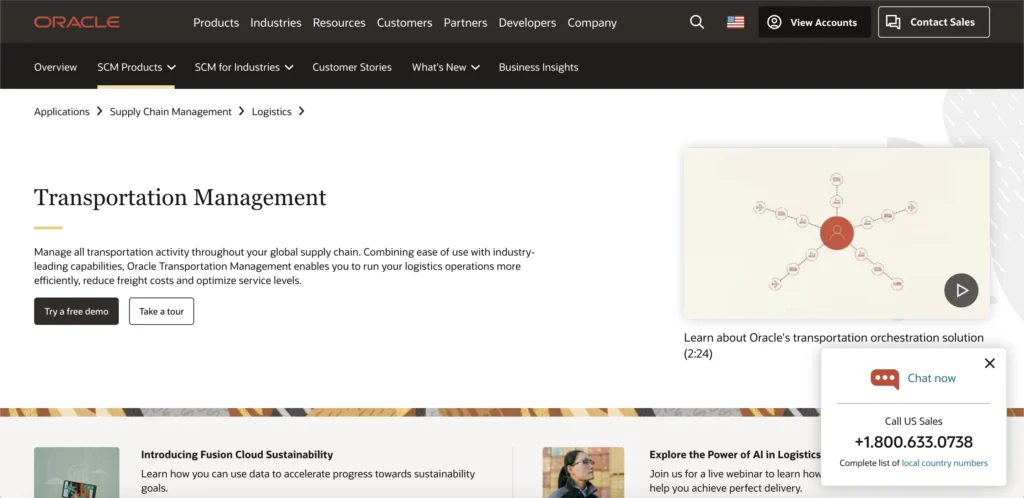
Key Features:
- Comprehensive Logistics Planning: Offers tools to optimize transportation routes, manage shipments, and streamline logistics operations.
- Automation and Integration: Automates billing, freight audits, and tracking while integrating seamlessly with existing systems.
- Real-Time Visibility: Provides live tracking and analytics to monitor transportation performance and ensure efficiency.
- AI and Machine Learning: Leverages advanced technologies for better transit time predictions and dynamic resource allocation.
Limitations:
- Integration Challenges: Difficulty in developing cross-functional or integrated reports and configuring the system to work seamlessly across environments.
- Usability Decline: Over time, the product’s usability has decreased, especially with its focus shifting toward cloud offerings, which are not yet fully capable of matching the functionality of the existing system.
Ratings:
- G2: 4/5
- Gartner: 4.7/5
Testimonials:
“Small scale industries better where they cant offered more money. It will not allow easy customization Oracle SCM Cloud allow only for small scale industries not for Large scale industries.”
4. Magaya – Tailored for Freight Forwarding
Magaya is a logistics software that provides freight forwarding, warehouse management, and transportation management solutions. Its transportation management software gives companies the resources to streamline transportation processes, cut costs, and enhance customer satisfaction.
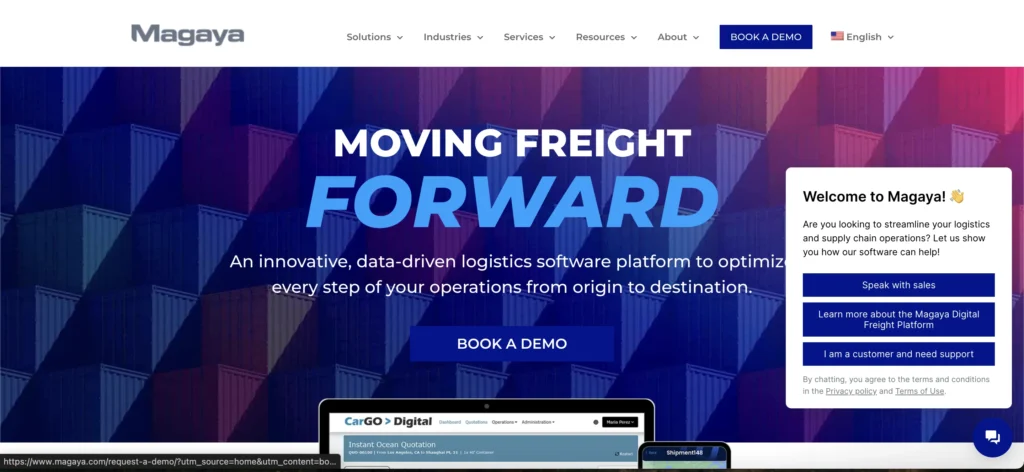
Key Features:
- Automation of Manual Tasks: Magaya automates repetitive tasks such as filing forms, tracking shipments, and handling customer queries. This reduces manual work, minimizes errors, and saves time across operations.
- Centralized Data Visibility: With better data visualization, Magaya enables centralized oversight of the entire supply chain. This enhances collaboration, speeds up decision-making, and ensures a smoother workflow.
- Customer-Centric Self-Service Options: The platform digitizes processes and offers self-service tools for customers, enhancing their experience with real-time updates and easy access to essential logistics information.
- Seamless Integration Across Systems: Magaya integrates smoothly with existing systems, allowing businesses to connect data and operations without the need for manual entry. This increases accuracy and efficiency while reducing human error
Limitations:
- Difficult Customization: Users find it hard to customize Magaya, especially when adding new fields or adjusting existing ones. This requires technical skills or external support, which can slow down the process.
- Insufficient Automation and Adaptability: Magaya lacks automation for some tasks, forcing users to rely on manual work. Additionally, it doesn’t adapt well to rapid changes in global trade needs, which can lead to inefficiencies.
Ratings:
- G2– 4.4/5
- Garnter– NA
Testimonials:
“Online easy to use, I can custom to my needs in our logistic company. The accounting part in the magaya software, which can not customize to our tax compliance in our country, hope the software can use in iOS platform. The magaya support team advice me to use windows instead iOS.”
5. Descartes Aljex Logistics – Innovative and Agile
Descartes Logistics provides various solutions for managing transportation operations, customs compliance, and supply chain visibility. Descartes Logistics also provides thorough supply chain visibility, enabling companies to trace shipments and keep an eye on performance throughout their entire supply chain.
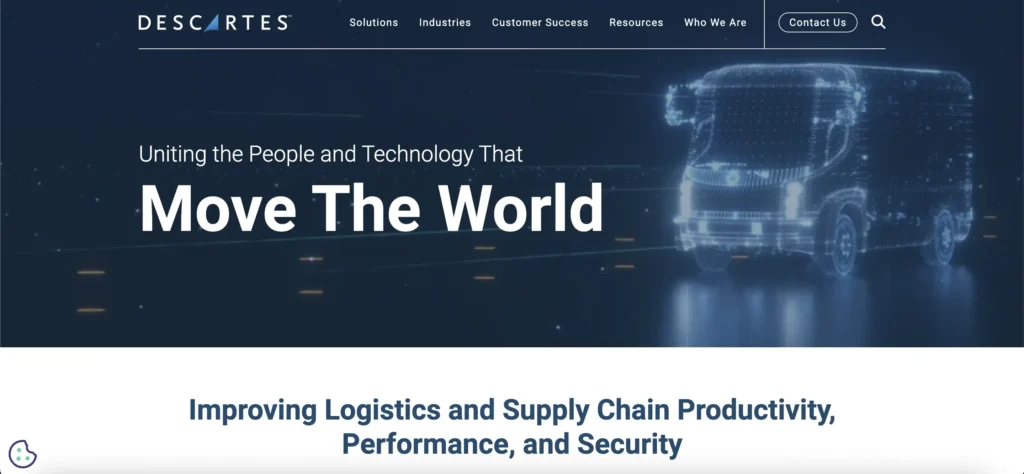
Key Features
- Centralized Carrier Management: Consolidates carrier details, rates, and performance metrics into one platform, simplifying carrier selection and rate negotiation.
- Lane Rate Consolidation: Brings together lane rates and related data, making it easier to analyze and compare shipping costs.
- Data-Driven Load Matching: Matches shipments with the most suitable carriers using both historical and real-time data, optimizing route planning and cost.
- Invoicing and Reporting Tools: Simplifies invoicing and reporting, providing detailed insights into financials and operational performance for better decision-making.
Limitations:
- Limited Load Duplication: Users are unable to duplicate multiple loads at once, which can be time-consuming. Implementing a feature for bulk load duplication would improve efficiency when entering loads into the system.
- Excessive Tabs and Interface Clutter: The interface has too many tabs, which can feel overwhelming and disorganized. Simplifying and consolidating the tabs would enhance usability and make navigation more intuitive.
Ratings:
- G2: 4.6/5
- Gartner: 4.0/5
Testimonials:
“Its precise and fast to understand, You can track the shippment. Interface can be adjusted to be more user friendly. I wish I could duplicate multiple loads at once instead of just one at a time. If this could be changed, it would help me save time when entering loads into the system.”
6. MercuryGate – Efficient and User-Friendly
MercuryGate provides cloud-based transportation management software and offers its clients a variety of solutions for managing their transportation operations. MercuryGate’s capacity to provide organizations with a unified platform for controlling all transportation activities is among its main advantages. Thanks to its extensive tracking and monitoring features, businesses can track shipments, evaluate performance, and make wise decisions based on real-time data.
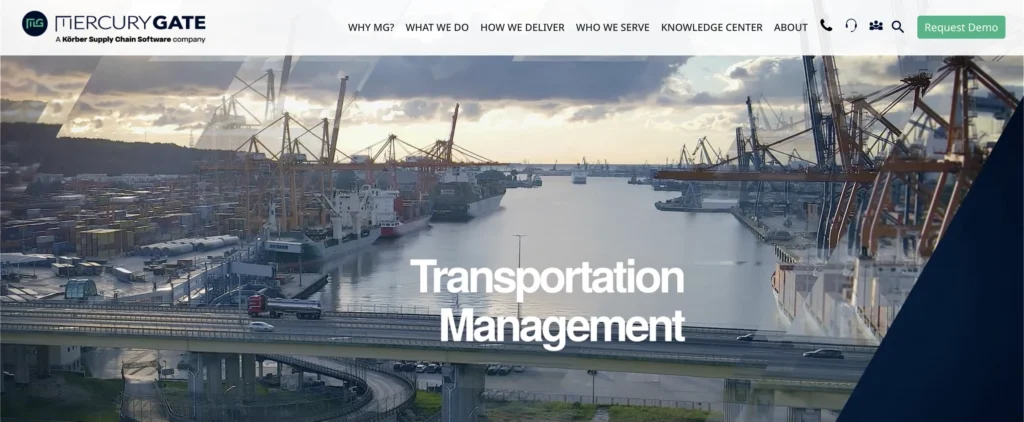
Key Features
- Freight Claims Management: Streamline freight claims by initiating, managing, and reporting to recover lost revenue, reducing manual effort and ensuring smoother financial recovery processes.
- Final Mile Routing and Scheduling: Optimize vehicle routing and scheduling from the first mile to the last mile, ensuring efficient deliveries with minimal cost and time.
- Multimodal Optimization: Plan and execute shipments across different transportation modes to cut costs, reduce complexity, and lower your carbon footprint while improving overall efficiency.
- Customs and Trade Compliance Automation: Automate customs clearance activities across all agencies to ensure continuous movement of goods, reducing delays and keeping compliance in check.
Limitations:
- Complex Customization and UI: Extensive customization options can be confusing and difficult to manage over time, while the legacy user interface is challenging to learn and navigate.
- Integration Limitations: Poor integration with ERP and WMS systems, along with a lack of open API support, makes it difficult to automate processes and integrate with modern services effectively.
Ratings:
- G2– 4.0/5
- Gartner– 4.4/5
Testimonials:
“Mercury Gate does well at its core functions and has a great support team to assist system problems and implementations. Mercury Gate does not do well to support with any custom feature or requests.”
7. Kuebix TMS – Versatile and Cloud-Based
Using Kuebix TMS, organizations may streamline their transportation processes and cut expenses. The solution offers real-time visibility, route optimization, and carrier management functions. Kuebix TMS offers comprehensive carrier selection capabilities that make it simple for organizations to evaluate prices and service quality across several carriers.
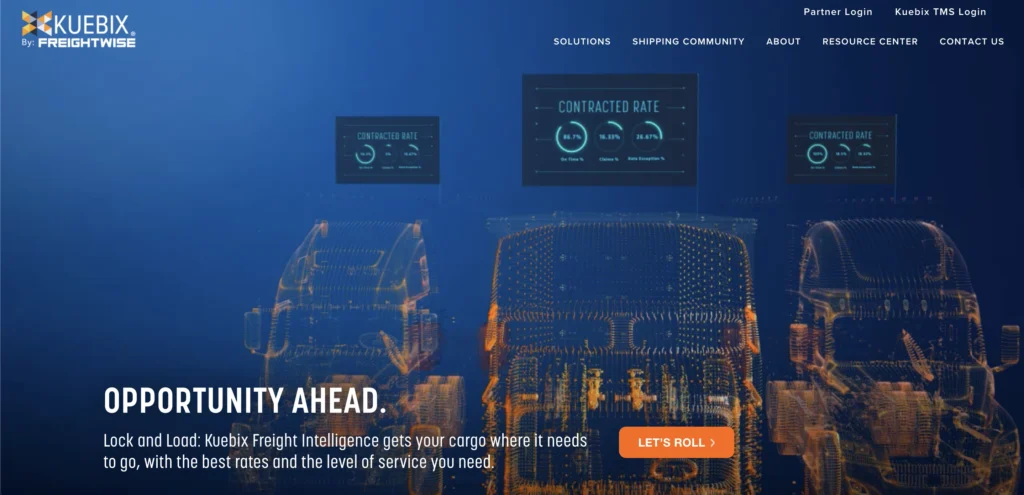
Key Features:
- Diverse Shipping Modes: Access a wide range of transportation options, including LTL, Truckload, Parcel, and Intermodal, to meet varied shipping needs.
- Seamless Carrier Integration: Connect with major carriers using API and EDI technology for quick setup, real-time data sharing, and streamlined operations.
- Enhanced Visibility & Analytics: Gain full shipment transparency and leverage detailed reporting tools to track performance and monitor KPIs effectively.
- Proven Industry Leadership: Trusted by top companies like Ahold USA for delivering competitive advantages through innovative logistics solutions.
Limitations:
- Limited Reporting Capabilities: Users have noted the lack of free access to their own data reports, which restricts flexibility in generating custom insights without additional costs.
- Integration and Feature Challenges: Some users experienced delays in resolving integration issues and found certain features lacking, such as difficulties with multi-pick and multi-drop shipment customization or auto-flagging overlength shipments.
Ratings:
- G2: NA
- Gartner: 4.6/5
Testimonials:
“Easy rate quote layout but lack of rate quote history reports that other TMS platforms offer. Also had conflicting pick up requests sent.”
8. FreightPOP
FreightPOP is a comprehensive cloud-based Transportation Management System (TMS) designed to streamline and simplify logistics processes for businesses. It offers a unified platform for managing freight and parcel shipments across various modes, including LTL, FTL, air, ocean, and rail.
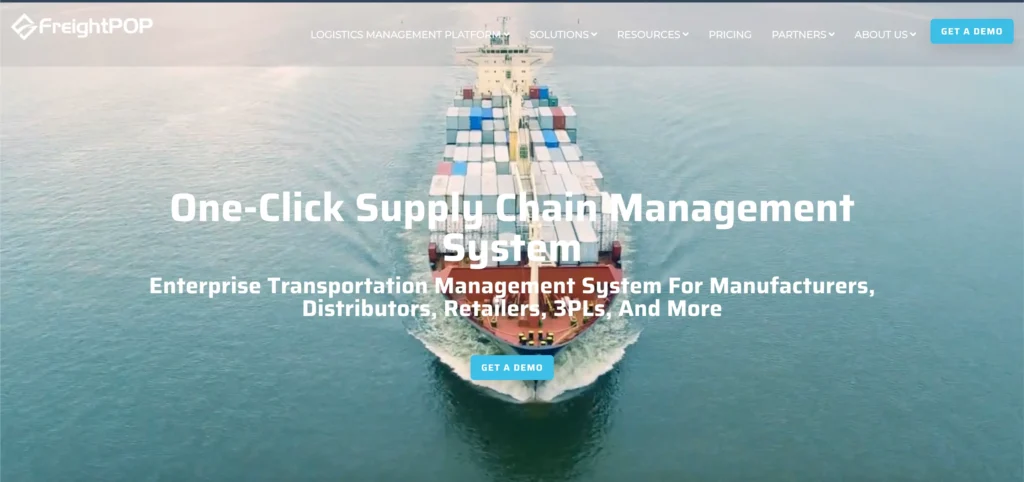
Key Features:
- Unified Shipping Platform: Manage planning, tracking, reporting, and billing for all shipping modes (LTL, FTL, Parcel, Ocean, Rail, Air) in one solution.
- Real-Time Shipment Visibility: Track shipments globally in real time and detect billing errors to streamline payments across carriers.
- Actionable Analytics: Leverage Microsoft Power BI for predictive insights, cost optimization, and carrier performance tracking.
- Flexible and Integrative Setup: Easy to implement with no long-term contracts and supports over 1500 integrations, including ERP, CRM, and accounting tools.
Limitations:
- Integration Gaps with Certain Platforms: FreightPOP does not currently support integration with some platforms, like Epicor Kinetics, which may limit its usability for businesses relying on specific systems.
- Unpolished Interface and Tracking Delays: While functional, the user interface is not visually appealing and could be more intuitive. Additionally, shipment tracking updates are not always automatic, causing potential delays in real-time monitoring.
Ratings:
- G2: 4.8/5
- Gartner: NA
Testimonials:
“The software just works. They have fabulous tech support. Wish they would have had an interface into Epicor Kinetics.”
9. Manhattan Associates
Manhattan Active® Transportation Management is a cloud-native, end-to-end transportation management software designed to optimize every aspect of your logistics network. Built for scalability and flexibility, Manhattan enables real-time optimization of routes, carrier management, and fleet resources.
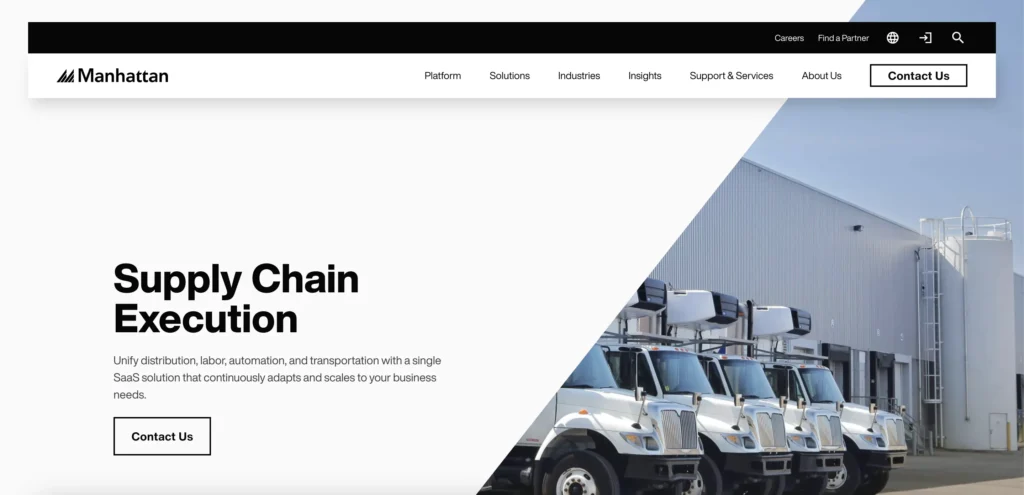
Key Features:
- Dynamic Optimization: Continuously updates routes and plans based on real-time factors like traffic, weather, and demand changes, ensuring efficient transportation operations.
- Interactive Network Visualization: Offers real-time maps, dashboards, and tools that allow users to easily monitor and manage the entire transportation network in one place.
- Scenario Testing and Decision Support: Allows businesses to simulate multiple scenarios, evaluate potential outcomes, and make data-driven decisions for improved operational performance.
- Fleet and Resource Management: Helps businesses efficiently allocate drivers, vehicles, and resources, ensuring balanced workloads, compliance with regulations, and reduced operational costs.
Limitations:
- Slow Optimization for Small Shippers: The system’s configuration can be complex for smaller shippers, and optimization run times may become too slow as the business scales.
- Integration Issues: Inccomplete integrations, like mapping discrepancies and unfinished courier connections, can cause operational disruptions.
Ratings:
- G2: 4.6/5
- Gartner: 3.4/5
Testimonials:
“Three years after the start of implementation, the TMS still does not meet requiremente for dinamic routing and invoice auditing.”
10. E2open
E2open is a cloud-based logistics management platform that connects businesses with suppliers, customers, and partners. It offers solutions for demand planning, transportation management, and inventory optimization, helping companies reduce costs and improve visibility. With AI-driven analytics and real-time shipment tracking, E2open enhances efficiency and collaboration, ensuring businesses stay on top of their logistics.
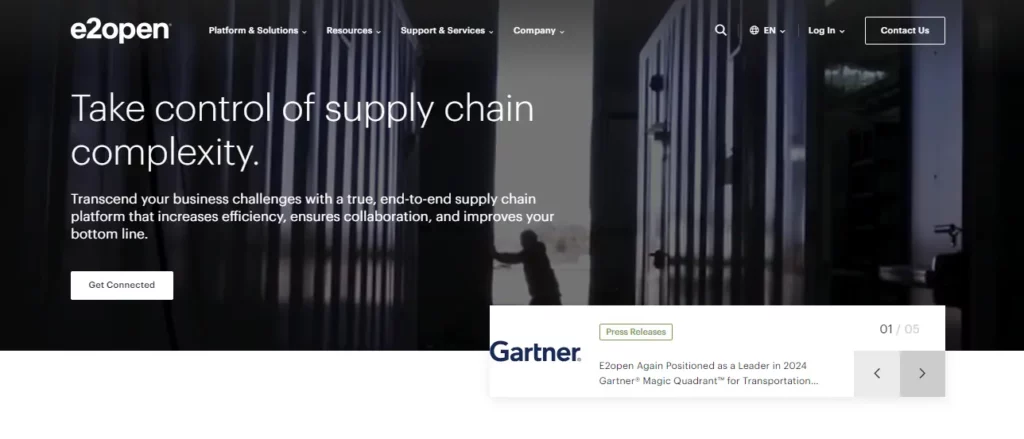
Key Features:
- Collaborative Network: E2open connects businesses with over 480,000 manufacturers, distributors, and logistics providers, fostering seamless collaboration across the supply chain.
- Predictive ETAs: The platform offers predictive ETAs, helping businesses anticipate delivery times and optimize their logistics planning.
- Cost Optimization: E2open allows users to compare carrier invoices, simplify contracts, and reduce logistics costs, providing better control over expenses.
- Real-Time Shipment Tracking: With real-time visibility and tracking across all modes of transport, E2open ensures businesses can monitor their shipments throughout the entire journey.
Limitations:
- Limited Integration with Other Software: E2open faces challenges when it comes to integrating seamlessly with all other software systems, limiting communication and data flow across different platforms.
- Limited Shipping Modes: E2open currently only supports road truck and rail carriers, excluding ocean freight and air shipment, which may hinder businesses that rely on these modes of transportation for global logistics.
Ratings:
- G2: 4.1/5
- Gartner: 4.3/5
Testimonials:
“Huge network amongst the shipping fraternity. Customer care service can be bit slow at times.”
11. CargoWise
CargoWise is a logistics management software designed for freight forwarders, customs brokers, and 3PL providers. It helps automate operations with features like real-time tracking, customs compliance, and warehousing management. The cloud-based platform offers easy integration, allowing teams to collaborate seamlessly.
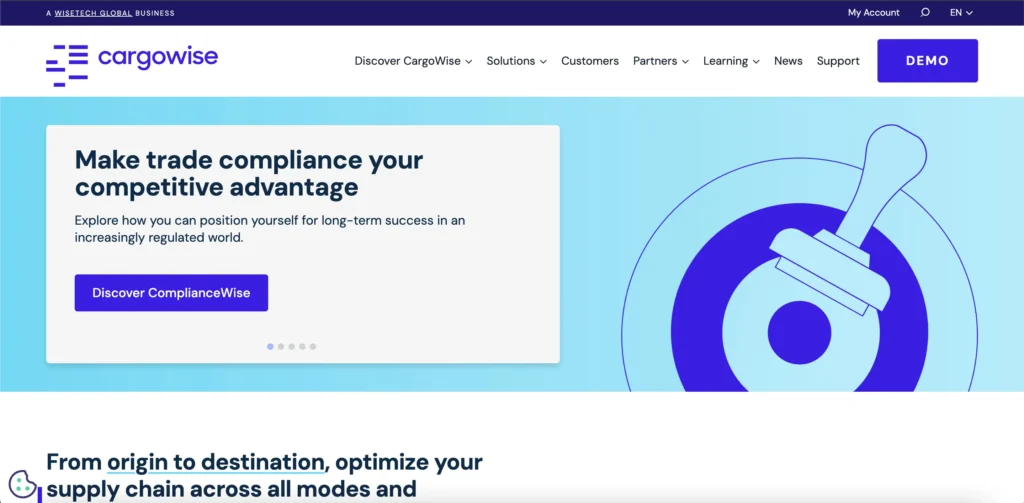
Key Features:
- Real-time Tracking: CargoWise allows you to track shipments in real time, giving you up-to-the-minute updates on the location and status of your goods.
- Customs Compliance: The software helps you manage and meet all customs regulations, ensuring that shipments pass smoothly through borders without delays or fines.
- Cloud-Based Integration: CargoWise connects with other systems and platforms through the cloud, enabling teams to work together from anywhere and share information easily.
- Advanced Reporting: CargoWise provides detailed reports on logistics operations, helping you analyze performance, identify areas for improvement, and make better business decisions.
Limitations:
- Difficult Customization: Users find it challenging to tailor the software to their specific needs, making customization a time-consuming process.
- Frequent System Bugs: Some users report bugs and crashes that disrupt operations, causing delays and reducing productivity.
Ratings:
- G2: 3.2/5
- Gartner: 4.3/5
Testimonials:
“It’s easy to use, and the platform has different tools to facilitate the experience. Sometimes the app disconnects instantly, becouse when this happen the info don’t save.”
12. ShipStation
ShipStation streamlines e-commerce shipping by integrating with multiple carriers and shopping carts. It simplifies order management, label printing, and real-time tracking, saving businesses time and reducing errors. The platform also offers automation tools to handle repetitive tasks and provides detailed shipping analytics to track costs and performance.
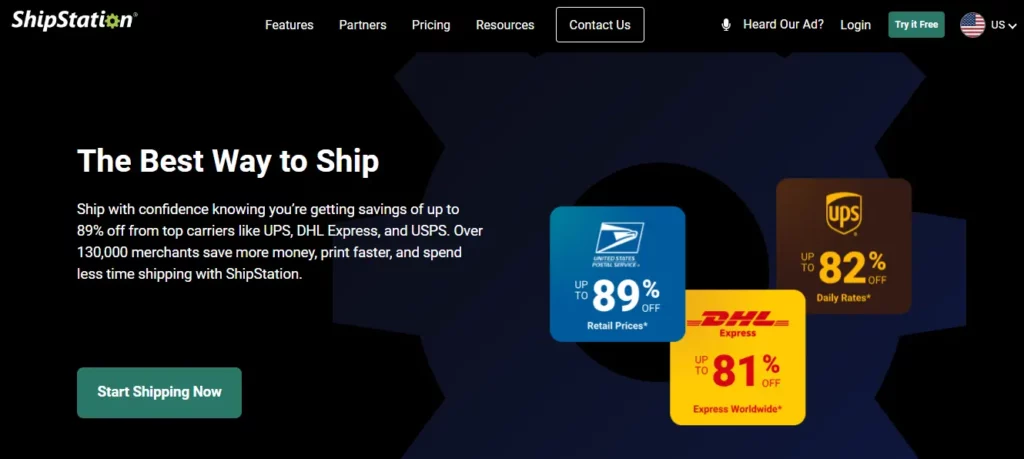
Key Features:
- Pre-Negotiated Shipping Rates: The platform allows access to pre-negotiated rates with top carriers, ensuring you get lower shipping costs compared to standard rates.
- Marketplace and Platform Integration: It easily connects with over 40 carriers, e-commerce platforms, and marketplaces, making logistics management simple and efficient for businesses.
- Automatic Cost Optimization: The system automatically selects the lowest-cost carrier service for each shipment, ensuring you always save on shipping expenses without manual effort.
Limitations:
- Inconsistent Customer Support: Users have expressed frustration with inconsistent support, especially as live help has been replaced with bots, making it difficult to resolve more complex issues.
- Complicated Login Process: The system requires multiple clicks (up to 30-40) every time users want to log in, leading to inefficiency and frustration for daily users.
Ratings:
- G2: 4.3/5
- Gartner: NA
Testimonials:
“Shipstation makes it super simple for users to manage thousands of parcels every day. Support is mostly out of hours and when the system goes down, theres not much you can do but wait.”
Conclusion
Selecting the right logistics management software is essential for improving operations, reducing costs, and staying competitive. Focus on your unique needs and ensure the software aligns with your goals. With tools like real-time tracking, automation, and scalability, the right choice will enhance efficiency and drive growth.



